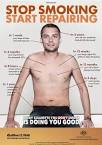Smoking Effects
- Health Effects of Smoking
- How to Stop Smoking
- Smoking Cessation
- Smoking and Cancer
- Quit Smoking Cigarettes
Don't Quit Alonewww.ndhealth.gov/ndquitsLog on for free advice,
chat forums and free patches.
Slimming Machineswww.htech.co.zaProven Slimming and Toneing
Results Manufacturers
Choose Gmail NowMail.Google.comYou Get Less Spam, More Storage
& Free SMS! Start Enjoying Gmail now.
The effects of smoking on human
health are serious and in many cases, deadly. There are approximately 4000 chemicals in cigarettes, hundreds of which are
toxic. The ingredients in cigarettes affect everything from
the internal functioning of organs to the efficiency of the body's immune
system. The effects of cigarette smoking are destructive and widespread.
Smoking
Effects on the Human Body
- Toxic ingredients in cigarette smoke travel throughout
the body, causing damage in several different ways.
- Nicotine reaches the brain within 10 seconds
after smoke is inhaled. It has been found in every part of the body and in
breast milk.
- Carbon monoxide binds to hemoglobin in red
blood cells, preventing affected cells from carrying a full load of
oxygen.
- Cancer-causing agents (carcinogens) in tobacco smoke damage
important genes that control the growth of cells, causing them to grow abnormally
or to reproduce too rapidly.
- The carcinogen benzo(a)pyrene binds to cells in the
airways and major organs of smokers.
- Smoking affects the function of the immune system and
may increase the risk for respiratory and other infections.
- There are several likely ways that cigarette smoke does
its damage. One is oxidative stress that mutates DNA, promotes atherosclerosis, and leads to chronic lung
injury. Oxidative stress is thought to be the general mechanism behind the
aging process, contributing to the development of cancer, cardiovascular
disease, and COPD.
- The body produces antioxidants to help repair damaged
cells. Smokers have lower levels of antioxidants in their blood than do
nonsmokers.
- Smoking is associated with higher levels of chronic
inflammation, another damaging process that may result in oxidative
stress.
Read more about how cigarettes harm
us from head to toe: The Effects of Cigarette Smoking


